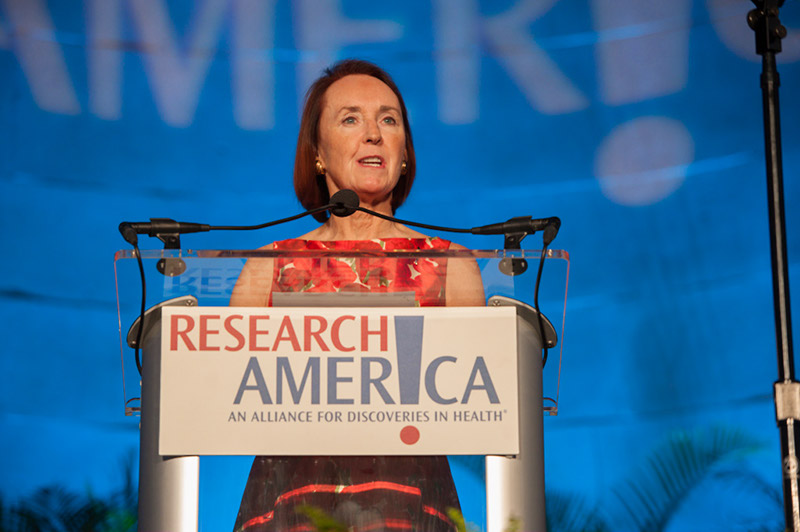Leadership Requires Investment

Dear Research Advocate,
Across the political spectrum, Americans agree it is important for the U.S. to be a global leader in health research (85%) and in science and technology (89%), according to data from our newly released national survey.
More than 8 in 10, across party identification, say investing in research is important to economic growth (83%) and important to creating jobs (85%). More than 7 in 10 say COVID-19 is a disruptive event calling for assigning a higher priority to S&T in the U.S. (71%). There is also bipartisan agreement that basic research which advances the frontiers of knowledge should be supported by the federal government (83%). It is important to make policymakers aware of these results as they make funding decisions (use our action alert below).
Other key survey findings include:
- Mental health eclipses cancer in the top-3 of greatest health concerns facing our nation.
- Confidence in scientists and public health officials remains high, but the partisan divide widens.
- Americans agree scientists should communicate their research to both the public (80%) and to elected officials (87%).
On the Hill: We applaud the Senate for the bipartisan vote to confirm Robert Califf, MD, as FDA Commissioner. As we emphasized in our statement, it’s critical for the FDA to have a Senate-confirmed leader to synthesize the lessons learned from COVID-19 and keep pace with rapidly evolving science.
Keeping pace also requires a strong budget. The FDA’s budget, along with those of other research-intensive agencies, has been flat funded for over four months. This week, the House passed – and the Senate is expected to vote on this evening – a short-term continuing resolution through March 11 to give Congress time to finalize FY22 appropriations.
Better late than never, we finally see light at the end of the proverbial tunnel as House and Senate leaders reach agreement on government-wide spending targets, enabling appropriations subcommittees to draft bills with specific agency and program-related funding levels to include in a FY22 Omnibus package. Email your representatives with our new survey results to urge their speedy action!
From the White House: Yesterday, President Biden appointed current OSTP Deputy Director Alondra Nelson, PhD, to perform the duties of the OSTP Director and Francis Collins, MD, PhD, to perform the duties of Science Advisor to the President and Co-Chair of the President’s Council of Advisors on Science and Technology until permanent leadership is nominated and confirmed.
As the White House asserted, “President Biden has doubled down on science” with these picks. The White House also highlighted OSTP’s broad role in driving science and technology solutions and underscored several Biden Administration priorities: establishment of ARPA-H, the Cancer Moonshot 2.0, selecting a new NIH Director, and the broad advisory work of PCAST.
FDA and CMS Intersection: Today we heard from Paul T. Kim, Partner, Foley Hoag LLP, about the critical intersection of the FDA approval and CMS coverage processes. Both bear significantly (to say the least) on medical progress and access to its benefits. Watch this informative discussion now.
Focus on Mental Health: Not only is mental health now a top-3 health concern (behind COVID-19 and the cost of health care), a majority (58%) of Americans don’t think federal investment in mental health research is adequate. The House E&C Subcommittee on Oversight and Investigations held a hearing today, “Americans in Need: Responding to the National Mental Health Crisis.” Witnesses discussed evidence-backed approaches, areas for further research, unmet needs, inequity in treatment and care, and the need for behavioral health to be part of pandemic preparedness.
Evolving Landscape of Science Communication: The pandemic has highlighted the tectonic shift in how society consumes scientific information – online and through the algorithms of social media platforms. In Science magazine, Dominique Brossard, PhD, and Dietram A. Scheufele, PhD, of University of Wisconsin-Madison share a thought-provoking perspective on The chronic growing pains of communicating science online, challenging the scientific community to pay more attention to the science of science communication.
Science communication is a focus of AAAS’s annual meeting this week, culminating in a plenary panel discussion, Does Science Communication Still Work?, on Sunday, February 20, 4 – 5:15 p.m. ET. The session is free and open to the public with basic registration.
Timely Discussion: Join a conversation with Former HHS Secretary Louis Sullivan, MD, on Tuesday, February 22, at 4 p.m. ET, hosted by the National Academies of Sciences, Engineering, and Medicine. Dr. Sullivan will discuss his life and work promoting education, access to care, and the importance of diversifying health professions and medical education. The conversation is part of a series on Black individuals in science, engineering, and medicine.
Honoring Leaders: Registration is open for our 2022 Research!America Advocacy Awards. Join us at 4 p.m. ET on March 16 to honor individuals and organizations whose leadership has advanced our nation’s commitment to medical, health, and scientific research. The virtual awards program is free and open to all.
Upcoming Member Discussion on Pandemic Preparedness: If your organization is a Research!America alliance member, join us on Thursday, February 24, at 1 p.m. ET for a roundtable discussion on short- and long-term pandemic preparedness advocacy priorities. If your organization is not a member, contact Anna Platt to learn about the benefits of membership.
Stay well, stay safe, and stay connected.
Mary Woolley




